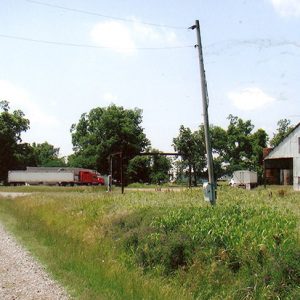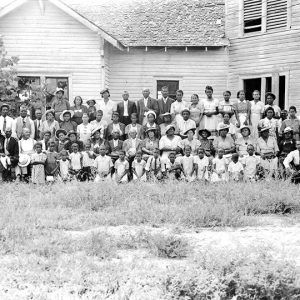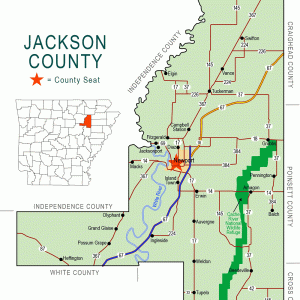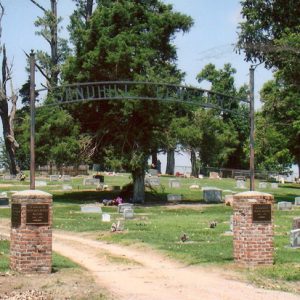calsfoundation@cals.org
Auvergne (Jackson County)
Auvergne of Jackson County is a small unincorporated community located about ten miles southeast of Newport (Jackson County) on land that was home to some of the area’s first settlers. Though occupied by the 1830s, no settlement began to emerge until the 1870s. During its heyday in the late nineteenth century, the community, positioned on a ridge between the White and Cache river bottoms, was home to a thriving timber trade and ample farming.
James T. Henderson, sometimes called the “father of Auvergne,” moved from Tennessee and settled in the area with twenty-five slaves in 1860. Establishing a large farm and orchard, he built his house just west of where the settlement would be. Local history records that it was Henderson’s wife who picked the settlement’s name. Two stories have evolved, both stating that the name was picked because of her fondness for it. One states that she had been reading a French novel that included the name, while another says that she saw the name stamped on a barrel of flour.
Attracted to the rich farm land and plentiful timber, people began to move to the area in the 1870s. Several of the settlers were Henderson’s former slaves, among them Henry Henderson, who became a leading farmer of the area. Though it lasted for only about sixteen months, a post office was established in the area on June 17, 1878, called Sand Hill. When a new post office was opened on September 12, 1882, several names where refused before Auvergne was decided upon. Richard T. Hardwood was the first postmaster.
During the surveying for a railroad in the mid-1880s, James T. Henderson had the area near the proposed railroad right-of-way platted into town streets. In 1885, the tracks of the narrow gauge Batesville and Brinkley Railroad came through. A station and depot were established for the approximately twenty miles of railroad that now connected the settlement with the St. Louis and Texas Railroad. During the next four years, the population saw steady growth. While many were attracted to the farm land, others came for work in the timber industry. By 1889, the settlement, which was said to have an inexhaustible supply of timber, was located near thirteen area sawmills. The settlement had grown to include a railroad depot, two general stores, a drugstore, a grist mill, a cotton gin, a blacksmith shop, a wood shop, and a school. By 1905, the number of sawmills had dropped to five, but some thirty train car loads of timber products were still being shipped out each month.
The growing community was home to the Methodist Episcopal Church South and the Pleasant Valley Baptist Church. The African-American community attended the African Methodist Episcopal Church. Several African-American fraternal organizations, such as the Grand United Order of Odd Fellows and the Household of Ruth, were also formed.
By the 1890s, children attended school about four miles south at Weldon (Jackson County). Locals felt that the school in Weldon was too far away and, with the help of James T. Henderson, organized an effort to establish a private school. In 1885, the Auvergne Academy opened in a newly constructed two-story building under the direction of Professor D. W. Bristol. The school, which at one time had approximately 100 students, published its own magazine, the Academic Monthly. A tornado hit the area in 1894, destroying the Methodist church, the railroad depot, and the academy. The academy never reopened.
The population of the community rose and fell with the national economy. With the establishment of Newport as the county seat in 1892 and its development as a regional commercial center, people began to move there. As the timber played out, most who remained farmed the land. Over the years, the population declined, and, in 1966, the post office was closed. Today, what little of the community of Auvergne survives is surrounded by farmland.
For additional information:
Davis, Minnie Vining. “Things Picked Up around Auvergne.” Stream of History 3 (October 1965): 3, 6.
Gregory, Mildred Minor. “Early Days of Auvergne.” Stream of History 12 (January 1974): 3–24.
Johnston, James H. “Auvergne and the Auvergne Academy.” Stream of History 3 (October 1965): 5–6.
Masterson, Mike. “Loss of Its Zip Code ‘Kills’ Arkansas Town.” Arkansas Gazette, October 15, 1972, p. 5E.
Mike Polston
CALS Encyclopedia of Arkansas










Comments
No comments on this entry yet.